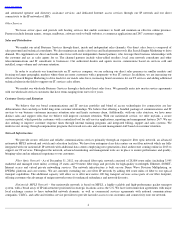Earthlink 2012 Annual Report Download - page 17
Download and view the complete annual report
Please find page 17 of the 2012 Earthlink annual report below. You can navigate through the pages in the report by either clicking on the pages listed below, or by using the keyword search tool below to find specific information within the annual report.
Table of Contents
Forbearance. The Communications Act provides the FCC with the authority to not enforce, or “forbear”
from enforcing, statutory
requirements and regulations if certain public interest factors are satisfied. If the FCC were to forbear from enforcing regulations that have been
established to enable competing broadband Internet access and VoIP, our business could be adversely affected. In December 2005, the FCC
granted, in part, a petition for forbearance filed by CenturyLink (formerly Qwest) seeking relief from specified dominant carrier regulations,
including some unbundling obligations related to high capacity loops and transport, in those portions of the Omaha metropolitan statistical area
where facilities-
based competition had allegedly increased significantly. The FCC's dominant carrier regulations require CenturyLink, in part, to
offer UNEs and also serve as a check on dominant carrier pricing for other wholesale services, such as special access lines, that we seek to
purchase at commercially acceptable prices. Since being granted relief by the FCC, CenturyLink has substantially increased the prices for the
network elements that we use to provide services in eight central offices in the Omaha metropolitan statistical area.
Since 2007, the FCC has denied a series of petitions by CenturyLink and Verizon seeking similar forbearance from dominant carrier
regulation in particular metropolitan areas. Most recently, the FCC in a June 2010 denying a CenturyLink petition for relief in Phoenix set forth
specific thresholds and analytical frameworks that must be met for grant of such petitions. That FCC decision was affirmed by a court of appeals.
If the FCC grants any forbearance or similar petitions filed by incumbent carriers in the future affecting markets in which we operate, our ability
to purchase wholesale network services from these carriers at cost-
based prices that would allow us to achieve our target profit margins in those
markets could be materially adversely affected. The grant of these petitions also would enable incumbent carriers to compete with their
competitors, including us, more aggressively on price in the affected markets.
Other Federal Regulation.
In addition to the specific matters listed above, we are subject to a variety of other FCC filing, reporting,
record-
keeping and fee payment requirements. The FCC has the authority generally to condition, modify, cancel, terminate, revoke or decline to
renew licenses and operating authority for failure to comply with federal laws and the FCC's rules, regulations and policies. Fines or other
penalties also may be imposed for such violations. The FCC or third parties may raise issues with regard to our compliance with applicable laws
and regulations. Moreover, we are subject to additional federal regulation and compliance requirements from other government agencies such as
the Federal Trade Commission, the Internal Revenue Service and the Securities and Exchange Commission.
State Regulation
We are subject to various state laws and regulations. Most state PUCs require providers such as us to obtain certificates of authority
from the commission before offering communications services between points within the state. In most states, we also are required to file tariffs
or price lists setting forth the terms, conditions and prices for specified services that are classified as intrastate and to update or amend our tariffs
when we adjust our rates or add new products. We also are subject to various reporting and record-
keeping requirements and contribute to state
USF, E911 and other funds, and pay other taxes, fees and surcharges where applicable. Certificates of authority can be conditioned, modified,
canceled, terminated or revoked by state regulatory authorities for a carrier's failure to comply with state laws or rules, regulations and policies
of state regulatory authorities. State utility commissions generally have authority to supervise telecommunications service providers in their
states and to enforce state utility laws and regulations. Fines or other penalties also may be imposed for violations. PUCs or third parties may
raise issues with regard to our compliance with applicable laws or regulations.
We have authority to offer intrastate long distance services in all 50 U.S. states, and have authority to offer local telephone services in
all 50 U.S. states and the District of Columbia. We provide local services, where authorized, by reselling the retail local services of the
incumbent carrier in a given territory and, in some established markets, by using incumbent carriers' network elements and our own local
switching facilities.
State PUCs have responsibility under the Communications Act to oversee relationships between incumbent carriers and their
competitors with respect to such competitors' use of the incumbent carriers' network elements and wholesale local services. State PUCs arbitrate
interconnection agreements between the incumbent carriers and competitive carriers such as us when requested by one of the parties. Under the
Telecommunications Act, the decisions of state PUCs with regard to interconnection disputes may be appealed to federal courts. There remain
important unresolved issues regarding the scope of the authority of PUCs and the extent to which the commissions will adopt policies that
promote local telephone service competition.
States also regulate in part the intrastate carrier access services of carriers such as us. As an interexchange carrier (“IXC”),
we are
required to pay intrastate access charges to local exchange carriers when they originate or terminate our intrastate long distance traffic. As a
CLEC, we charge IXCs intrastate access charges for the origination and termination services we provide to them. Under the FCC's November
2011 order, state commissions will have oversight of the intrastate access charge transition process to ensure that carriers comply with the FCC's
timing and required reductions. States will continue to review intrastate switched access tariffs, as well as interconnection agreements and
associated reciprocal compensation rates to ensure compliance
12
























